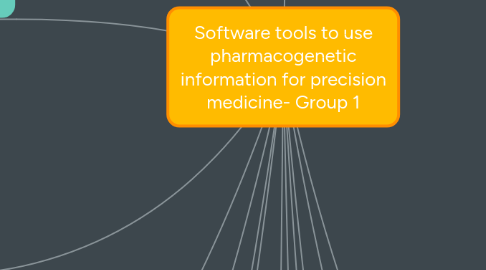Software tools to use pharmacogenetic information for precision medicine- Group 1
Oscar Perezにより


1. WfG - Watson for Genomics
1.1. An Artificial intelligence software that analyzes and categorizes genetics alterations related to disease progression in hematological patients. It provides potential therapeutic options at the rate of 3 minutes per sample.
2. Companies working on developing precision medicine software
2.1. Clinical trial matching
2.1.1. 2bPrecise
2.2. Web-based tool
2.2.1. Syapse
2.2.2. PrecisionFDA
2.3. AI-driven software
2.3.1. Fabric Genomics
2.3.2. SOPHiA
2.3.3. Human Longevity Inc
3. Human Protein Atlas
3.1. Consortium devloping specific antibodies against every protein encoded in the human genome. Antibodies are then used to determine the cellular location of every protein in cells of human tissue.
4. NCBI - National Center for Biotechnology Information
4.1. The SPDI data model at NCBI defines variants attributing to sequence, position, deletion and insertion of nucleotides and proteins. SPDI aggregates variants in order to clarify genetic basis of disease and biological function.
5. NCI - National Cancer Institute
5.1. The Genomic Data Commons has an information system for storing, analyzing and sharing raw genomic and clinical data from cancer patients. Data is continuously analyzed in order to be used for all NCI cancer genomics projects.
6. Uniprot - Protein Database
6.1. The UniProt knowledgebase is a large resource of protein sequences and associated detailed annotation. The database contains over 60 million sequences, of which over half a million sequences have been curated by experts who critically review experimental and predicted data for each protein.
7. Difficulties applying Precision Medicine
7.1. Lack of 'open source' molecular medicine global knowledge network
7.1.1. Protecting patient information
7.1.2. Requires patient education and consent
7.2. Collection of Patient Samples
7.3. Introduction of new biomarkers
7.3.1. Multiple single biomarker tests become unfeasible
7.3.1.1. Need development of next-generation sequencing technologies such as new assays for multiple biomarkers
